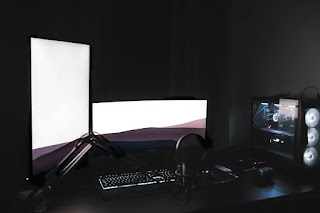Things to Consider Before Purchasing a Gaming PC
How much you spend on your next gaming PC is entirely up to you, but whatever your budget, there are certain factors you should consider before making your purchase so that you can be sure it's worth the money. These tips will help guide you toward a better understanding of what you're buying and all the information needed before your new PC gaming setup.
Gaming Accessories
When purchasing a gaming PC, consider what accessories you'll need. You may not need certain items at first, but don't be too hasty about cutting costs on these essentials.
PC Monitor Resolution
Resolution is something you should consider before buying a gaming desktop. How sharp is your display? While getting used to lower resolutions is possible, it is harder for your eyes. Acer ED3 ED323QUR Display diagonal monitor with Full HD 1080p resolution of 2560 x 1440 pixels is your best option. It features built-in graphics processors that can boost frame rates on compatible computers. This means less lag and less chance of motion sickness when playing games.
PC Monitor Type (TN/IPS/OLED/PLS)
The type of monitor you choose is arguably one of the most critical decisions when getting your gaming PC. TN/IPS monitors tend to have higher refresh rates, whereas OLEDs and PLS monitors are known for their unique colours. An excellent example of an ideal display PC Monitor type meant for PC gaming would be ASUS XG27WQ, 68.6 cm (27") Full HD 2560 x 1440, Quad HD LED Backlight Monitor. This display has a TN panel, making it great for fast-paced games like first-person shooters (FPS). If you can spend a little more money, look into getting an IPS or OLED display—they provide rich colours and deep blacks that will enhance your gaming experience.
Graphics Card
The graphics card is arguably one of the essential parts of a gaming PC. This component, which typically resides inside your desktop's tower case, is responsible for feeding all those pretty pictures to your monitor or TV. Your monitor won't be much use without it! Most moderngraphics cards are designed with portability in mind, so you can easily install them into any compatible computer chassis. When choosing a graphics card, look at factors such as size measured by its length, cooling requirements and whether it supports multiple monitors.
Motherboard Type (Z170 vs Z270)
Motherboards are some of the most critical components in any computer, as they dictate what type of components you can use and how your entire machine will work. If you're building a gaming PC, you have two choices for motherboards: Z170 and Z270. The difference is that Z170 boards support older processors (like Skylake) while Z270 boards support newer ones (like Kaby Lake). If you want to play games at high settings with a processor like an i7-7700K or i7-6700K, you should go with a Z270 motherboard.



Comments
Post a Comment